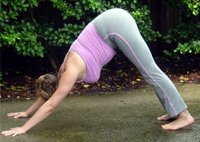Constance asked:
"Any suggestions for getting rid of acid reflux that don't involve antacids?"Yes, a few come to mind.1
First, some background.
 The number of people in the US known to experience symptoms of GERD at least once a month about equals the entire population of the UK. There's no inference there that British food causes heartburn. This number does not include the people who suffer in silence, which is an ordeal in itself given that belching often appears on a list of GERD's symptoms.
The number of people in the US known to experience symptoms of GERD at least once a month about equals the entire population of the UK. There's no inference there that British food causes heartburn. This number does not include the people who suffer in silence, which is an ordeal in itself given that belching often appears on a list of GERD's symptoms.The goal for managing GERD is to keep stomach contents within the confines of the stomach, and/or to lessen the harmful effects of stomach contents that involuntarily enter the esophagus. There's a muscle that rings the place where the esophagus empties into the stomach. It's called a sphincter; because it's at the lower end of the esophagus it's known as the Lower Esophageal Sphincter or LES.2 A healthy LES squeezes closed after food passes into the stomach. If it gapes, stomach contents can splash back into the esophagus. That might not be too uncomfortable or worrisome, but for the tenacious effort the body makes at keeping stomach contents acidic.
Now some suggestions. I'll categorize these into physical therapies and chemical therapies.
Physical Therapies - Making Gravity Work For You
- Do not bend over or, if you're so moved, stand on your head, after eating. Any form of reclining falls into this category. If your sleeping position involves lying down, it's not a bad idea to make sure most of your meal has left your stomach before getting some shut-eye; 20 minutes is not long enough, 2 to 3 hours is much better. Elevating your head and upper back while sleeping is also helpful. Elevating just your head with a few pillows while leaving most of your torso in a horizontal position can cinch your esophageal pipe, impeding pressure-reducing burps.
 Yoga is recommended as a therapy for heartburn. For its ability to hasten gastric emptying, and temper stress, it's one fine tool in the arsenal. One caveat (forgive me if this is obvious): certain poses, such as downward facing dog (shown), should be avoided after a meal.
Yoga is recommended as a therapy for heartburn. For its ability to hasten gastric emptying, and temper stress, it's one fine tool in the arsenal. One caveat (forgive me if this is obvious): certain poses, such as downward facing dog (shown), should be avoided after a meal. - Do not shake contents. Jumping up and down shakes contents. There are other less deliberate forms of shaking. These include abrupt laughter (may you be so blessed), hic-cups (may you never be so cursed) (although if you are, digital rectal massage has been shown to terminate intractable hiccups), and spontaneous operatic singing. I'm not sure if rapping (Eminem, 50 cent) puts demands on the diaphragm enough to count. I'll go rap in front of the mirror and get back to you on that.
- Do not cinch the sac that contains the contents. Think of what would happen if you squeezed a partially-filled water balloon - and the nozzle had a leak. Tight belts cinch contents. So do elastic waists, tight jeans, girdles, spandex, long compressing hugs, and sucking it in when your amour du jour walks by.
Any condition that expands girth is tantamount to cinching the sac. It can increase gastric pressure and contribute to acid reflux. Pregnancy and obesity are two. Another is overeating, which leads to my last tip ... - Do not consume large meals. A big food dump increases upward pressure. If your eyes are bigger than your stomach, close them.
I'll discuss chemical therapies in a later post.
Thus, as with any medical condition, it's prudent to check with your physician before adopting advice you may read on a blog.
2 Illustation of LES by Christy Krames, MA CMI.

No comments:
Post a Comment